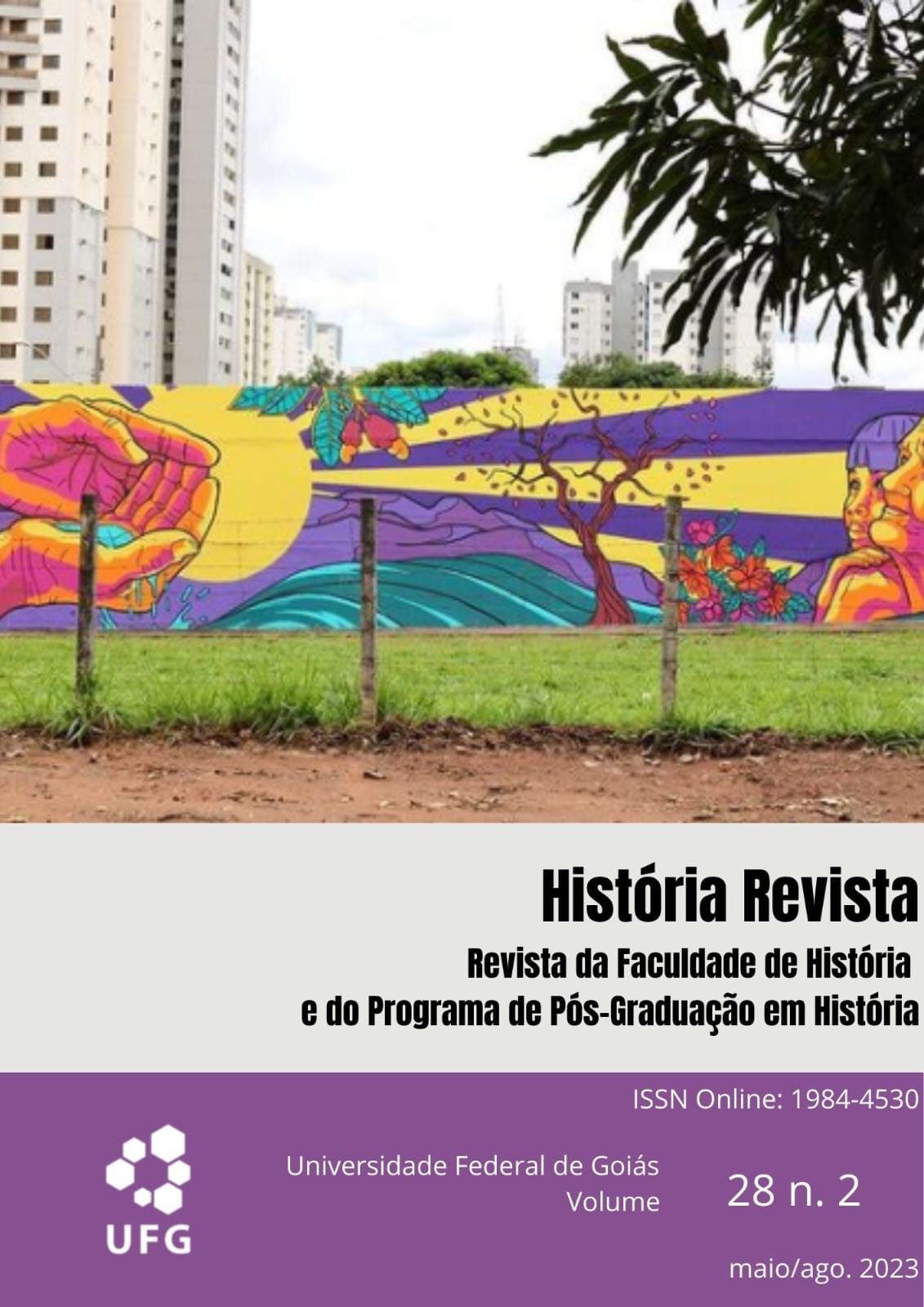Places of learning, narratives, recognition and formation of historical consciousness
DOI:
https://doi.org/10.5216/hr.v28i2.77337Keywords:
history teachingAbstract
This paper aims to debate the relationship between the concept of “places of pedagogy” with a combination of the concepts of “places of memory”, by Pierre Nora, and “anomalous places of learning”, by Elizabeth Ellsworth, as tools to avaliate monuments , to establish a dialogue between different areas of knowledge, particularly with historical learning. The pedagogical potential of knowledge as the formation of “learning places” could be understood by communicating relationships between present, past and future, through certain narratives, which are linked to the formation of historical consciousness. The complex relationship between the teaching and learning of national histories is nuanced by recognition as a principle that adds value to something, based on criteria, parameters or circumstances which makes the object valued due to these contingencies, enhancing the construction of identities. Thus, the relationship between learning, monuments and the formation of historical consciousness is highlighted.
Keywords: learning places; historical learning; teaching History.
Downloads
References
ALBIERI, Sara. História pública e consciência histórica. In. ALMEIDA, J.R./ histórica. In. ALMEIDA, J.R./ ROYAL, M.G.O. (orgs.). Introdução à história pública. São Paulo: Letra e Voz, 2011, pp.19-30.
ALBUQUERQUE JR.,Durval Muniz de.A necessária presença do outro, mas qual outro? Reflexões acerca das relações entre história, memória e comemoração. In.CEBALLOS, R./BEZERRA, Josineide S.História, Memória e Comemorações. Campina Grande: EdUFCG,2012, pp.11- 25.
ANDERSON, Stephane. The Stories Nations Tell: Sites of Pedagogy, Historical Consciousness, and National Narratives. Canadian Journal of Education/Revue Canadienne De l’éducation, v. 40, n. 1, p. 1-38, 2017.
ANDRADE, Juliana Alves; PEREIRA, Nilton Mullet. Ensino de História e suas práticas de pesquisa. São Leopoldo: Oikos, 2021.
APPLE, Michael. Educando à direita: mercados, padrões, Deus e desigualdade. São Paulo: Cortez/Instituto Paulo Freire, 2003.
BARCA, Isabel. Educação Histórica: uma nova área de investigação. Revista da faculdade de Letras História. Porto, III série, vol. 2, 2001, pp. 013-021.
BLIGHT, David. Derrubar todos os monumentos do mundo não muda o que aconteceu. Entrevista a Gerardo Lissardy, BBC News Mundo, New York, 2020. Disponível em www.bbc.com. Acesso em 02/09/2022.
BORRIES, Bodo von. Jovens e Consciência Histórica. Curitiba: W & A Editora, 2016.
BORRIES, Bodo Von.Von Borries, B. ‘The experience of and reflection on triangulation and/or mixed methods, discussing a study on the ideal and reality, use and understanding of history textbooks’. History Education Research Journal, 16 (1): 103–1,2019.
BRUNER, Jerome S. A Cultura da Educação. Porto Alegre: Artmed, 2001.
CARRETERO, Mario/ RODRIGUEZ, Cesar López. Estudios sobre el aprendizaje y la enseñanza de la Historia: implicaciones para el desarrollo de la alfabetización histórica. In. Ciências & Letras, Porto Alegre, n. 49, p. 139-155, jan./jun. 2011.
CARRETERO, M.; BERGER, S.; GREVER, M. Palgrave Handbook of Research in Historical Culture and Education. London: Palgrave Macmillan, 2017.
DAVISON, C. M. Knowledge translation: Implications for evaluation. In: OTTOSON, J. M.; HAWE, P. (eds.), Knowledge utilization, diffusion, implementation, transfer, and translation: Implications for evaluation. New Directions for Evaluation, p.75–87, 2009.
DUBET, François. Tous inégaux, tous singuliers. Paris: Editions du Seuil, 2022.
DUBET, François; MARTUCCELLI, Danilo. En la escuela. Sociologia de la experiência escolar. Buenos Aires: Losada, 1998.
DUBET, François. As desigualdades multiplicadas. Ijuí: Unijui, 2003.
DUBET, François. La escuela de las oportunidades. Que es una escuela justa? Barcelona: Gedisa, 2005.
ELLSWORTH, Elizabeth. Places of Learning. New York: Taylor & Francis Group, 2005.
FORQUIN,Jean Claude. Escola e Cultura.Porto Alegre:Artes Médicas, 1993.
GADAMER, H. Truth and method . London, England: Bloomsbury, 2013.
HARTOG, François. Confrontations avec l´histoire. Paris: Gallimard, 2021.
HONNETH, Axel. Reificação. Um estudo de teoria do reconhecimento. São Paulo: UNESP, 2018.
HOBSBAWN, Eric J. Nações e Nacionalismo desde 1780. Rio de Janeiro: Paz e Terra, 1990.
KÖRBER, Andreas. Analysing Monuments using crosstabulations of Historical Thinking Competencies and Types of Narrating.In. Historisch Denken Lernen. Hamburg: Arbeitsbereich Geschichtsdidaktid der Universität Hamburg,2018.
KOSELLECK, R. Futures past: On the semantics of historical time . New York, NY: Columbia University Press, 2004.
LESSARD-HÉBERT, M./GOYETTE, G./ BOUTIN, G.Investigação Qualitativa. Fundamentos e Práticas. Lisboa: Instituto Piaget,1994.
LEVESQUE, Stephane. Going Beyond “Narratives vs Competencies: A model of History Education.Toronto: HOME › 4 (2016) 12.
NORA, Pierre. Between memory and history. In Realms of memory: The construction of the French past . New York, NY: Columbia University Press, 1996.
ROCKWELL, Elsie (coord.). La escuela cotidiana. Mexico: Fondo de Cultura Económica, 1995.
RÜSEN, Jörn. Teoria da História. Uma teoria da História como ciência. Curitiba: Editora UFPR, 2015.
RÜSEN, Jörn. Cultura histórica, formação e identidade. Sobre os fundamentos da Didática da História. Curitiba: WAS Edições, 2022.
SCHMIDT, M.Auxiliadora. Didática Reconstrutivista da História. Curitiba: CRV 2020
SEIXAS, Peter Seixas, “A History/Memory Matrix for History Education,” in: Public History Weekly 4 (2016)
WERTSCH, James V. Specific Narratives and Schematic Narratives Templates. In. SEIXAS, Peter(org.) Theorizing Historical Consciousness. Toronto: University of Toronto Press, 2004, pp49-62.
YOUNG, Michael. Para que servem as escolas. In. Educação e Sociedade. Campinas: vol.28,n.101, pp.1287-1302, set./dez., 2007.
Downloads
Published
How to Cite
Issue
Section
License
Copyright (c) 2024 História Revista

This work is licensed under a Creative Commons Attribution 4.0 International License.
Declaração de Direito Autoral
Concedo à História Revista o direito de primeira publicação da versão revisada do meu artigo, licenciado sob a Licença Creative Commons Attribution, que permite o compartilhamento do trabalho com reconhecimento da autoria e publicação inicial nesta revista.
Afirmo ainda que meu artigo não está sendo submetido a outra publicação e não foi publicado na íntegra em outro periódico, assumindo total responsabilidade por sua originalidade, podendo incidir sobre mim eventuais encargos decorrentes de reivindicação, por parte de terceiros, em relação à autoria do mesmo.



